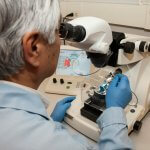To celebrate International Women’s Day, we’re taking a brief look at the career of one of the most pioneering women in modern medicine; Dr. Joanne Kurtzberg.
Joanne Kurtzberg & the first cord blood transplants.
Dr. Joanne Kurtzberg is a researcher at Duke University, she is a pioneer who is advancing the development of stem cell therapies, particularly those using umbilical cord blood.
In 1988 Joanne Kurtzberg was involved in the world’s very first umbilical cord blood stem cell transplant [1] which treated a boy for Fanconi Anaemia using his sister’s cord blood. Then in 1993, Kurtzberg went on to perform the first successful unrelated cord blood transplant [2]. Since that first cord blood transplant in 1988, over 35,000 cord blood transplants have been performed [3].
Joanne Kurtzberg, advancing the use of cord blood.
Today Kurtzberg is advancing the application of umbilical cord blood treatments for a variety of illnesses including blood disorders, genetic diseases and brain injuries. Speaking to Duke University, Kurtzberg said “I’ve learned that after a cord blood transplant, donor cells help heal the brain. My current research is focused on finding ways to use cord blood cells to help children with Krabbe disease, MLD, ALD, Hurler syndrome and other leukodystrophies. I am also developing new treatments for children with birth asphyxia, cerebral palsy and autism as well as for adults with stroke [1] .”
Currently there is no cure for cerebral palsy, however, in 2012 Kurtzberg began to enrol patients with cerebral palsy who had banked their cord blood at birth in a clinical trial. The pioneering trial aimed to investigate the application of cord blood in treating the illness. Preliminary results of the trial have showed improved brain development and motor skill in 70% of participants.
In 2014 a $15 million grant was given to Kurtzberg and her team to help fund a $41 million 5-year project. The money is to fund research to investigate the application into stroke, autism, and other brain disorders. The results of this research are eagerly anticipated.
Kurtzberg’s research has only been possible because families choose to store their baby’s cord blood in family banks. Kurtzberg has made, and continues to make, a valuable contribution to medicine and the advancement of stem cell research. Thank you, Dr. Kurtzberg.
[2] http://ccbb.duke.edu/about-cord-blood/history-cord-blood
[3] http://www.nationalcordbloodprogram.org/








